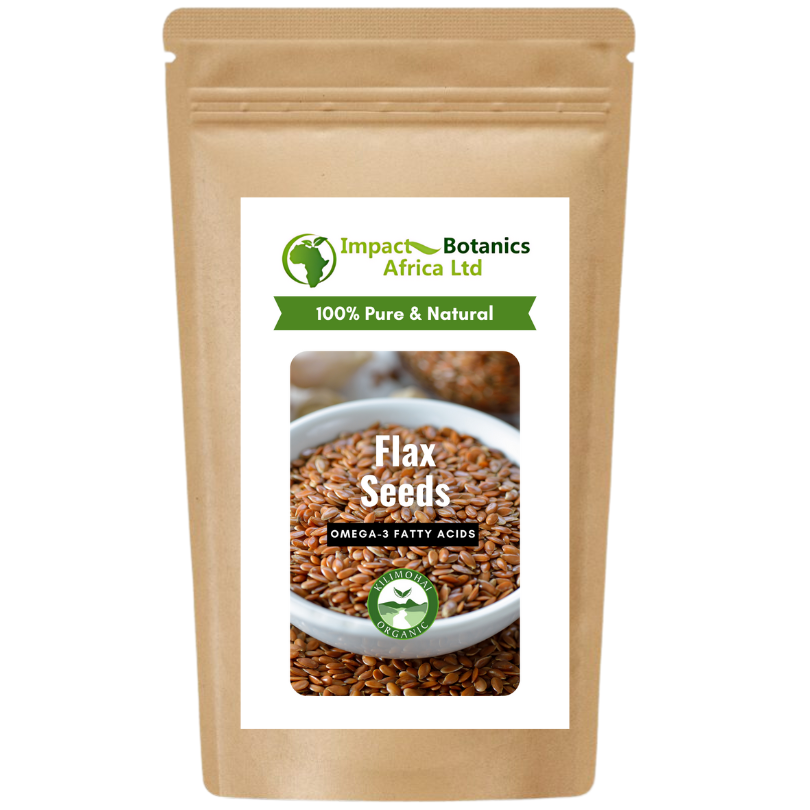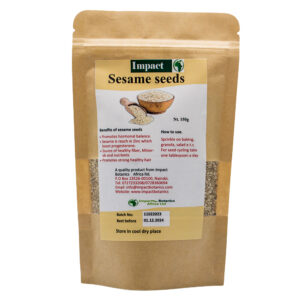Description
Flax seeds, also known as linseeds, are tiny seeds derived from the flax plant (Linum usitatissimum), which has been cultivated for thousands of years for its culinary, medicinal, and industrial uses. Flax seeds are a rich source of nutrients and offer numerous health benefits. Here are some key aspects of flax seeds:
- Nutritional Profile: Flax seeds are incredibly nutritious, packed with essential nutrients. They are an excellent source of plant-based omega-3 fatty acids, particularly alpha-linolenic acid (ALA), which is beneficial for heart health and brain function. Flax seeds are also high in dietary fiber, both soluble and insoluble, which aids in digestion, promotes bowel regularity, and helps control blood sugar levels. Additionally, flax seeds are rich in lignans, which are antioxidant compounds that may have anti-cancer properties.
- Heart Health: The omega-3 fatty acids found in flax seeds have been shown to have numerous benefits for heart health. ALA helps reduce inflammation, lower blood pressure, and decrease the risk of heart disease. Regular consumption of flax seeds may help improve cholesterol levels by reducing LDL (bad) cholesterol and increasing HDL (good) cholesterol. Including flax seeds in the diet may also help prevent the formation of blood clots and reduce the risk of stroke and heart attack.
- Digestive Health: Flax seeds are an excellent source of dietary fiber, which is essential for digestive health. The soluble fiber in flax seeds forms a gel-like substance in the digestive tract, which helps slow down digestion, promote satiety, and regulate blood sugar levels. The insoluble fiber adds bulk to stools, preventing constipation and promoting regular bowel movements. Consuming flax seeds regularly can help maintain a healthy digestive system and prevent digestive disorders like constipation, diarrhea, and diverticulitis.
- Weight Management: The combination of fiber, healthy fats, and protein in flax seeds can help support weight management efforts. The fiber content helps increase feelings of fullness and satiety, reducing appetite and calorie intake. Additionally, the omega-3 fatty acids in flax seeds may help boost metabolism and promote fat burning. Including flax seeds in your diet can be a valuable component of a balanced weight loss or weight maintenance plan.
- Blood Sugar Control: Flax seeds may help regulate blood sugar levels, making them beneficial for individuals with diabetes or insulin resistance. The soluble fiber in flax seeds slows down the absorption of glucose in the bloodstream, preventing spikes in blood sugar levels after meals. This can help improve insulin sensitivity and reduce the risk of type 2 diabetes. Including flax seeds in meals or snacks can help stabilize blood sugar levels and prevent energy crashes.
- Anti-inflammatory Effects: Flax seeds contain compounds with anti-inflammatory properties, including omega-3 fatty acids and lignans. Chronic inflammation is linked to various health conditions, including heart disease, diabetes, arthritis, and cancer. Consuming flax seeds regularly may help reduce inflammation in the body and lower the risk of chronic diseases.
- Brain Health: The omega-3 fatty acids in flax seeds are essential for brain health and cognitive function. ALA is a precursor to other omega-3 fatty acids, such as EPA and DHA, which are important for brain development and function. Including flax seeds in the diet may help improve memory, concentration, and overall cognitive performance, reducing the risk of age-related cognitive decline and neurodegenerative diseases like Alzheimer’s.
- Skin and Hair Health: Flax seeds contain nutrients that benefit skin and hair health. The omega-3 fatty acids help moisturize the skin, reduce inflammation, and promote a clear complexion. The lignans in flax seeds have antioxidant properties that protect the skin from free radical damage and premature aging. Additionally, flax seeds are rich in protein and essential fatty acids, which are important for strong, healthy hair growth.
- Hormonal Balance: Flax seeds contain lignans, which are phytoestrogens that may help balance hormone levels in the body. Phytoestrogens have a weak estrogenic effect, which may be beneficial for women experiencing symptoms of menopause, such as hot flashes, night sweats, and mood swings. Including flax seeds in the diet may help alleviate these symptoms and promote hormonal balance.
- Cancer Prevention: Some research suggests that flax seeds may have anti-cancer properties due to their high lignan content and antioxidant activity. Lignans have been shown to inhibit the growth of cancer cells, particularly hormone-sensitive cancers like breast, prostate, and ovarian cancer. Consuming flax seeds regularly as part of a healthy diet may help reduce the risk of certain types of cancer.
Overall, flax seeds are a nutrient-dense superfood with numerous health benefits. Whether consumed whole, ground, or as flaxseed oil, flax seeds can be a valuable addition to a healthy diet and lifestyle. It’s easy to incorporate flax seeds into your daily routine by adding them to smoothies, oatmeal, yogurt, salads, baked goods, or homemade energy bars. However, it’s important to consume flax seeds in moderation, as they are calorie-dense, and excessive intake may cause digestive issues for some individuals. Additionally, ground flax seeds are more easily digested and absorbed by the body compared to whole seeds. As with any dietary supplement, it’s best to consult with a healthcare professional before adding flax seeds to your diet, especially if you have any underlying health conditions or are pregnant or breastfeeding.






Reviews
There are no reviews yet.